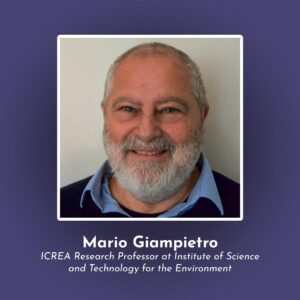
Show Summary
On this episode, Nate is joined by biophysical analyst Mario Giampietro to unpack his decades of research on a wide-lens view of the challenges facing the human system. With current metrics that only optimize for one variable, increasingly reductionist academic fields, and scientific communication consistently falling short, researchers who look at how all the pieces of our predicament fit together and most effectively help others understand will become more essential. How does the scope with which we look at a problem affect the subsequent information we gather and decisions we make? In what way should we frame the narratives that we create to best inform our leaders and the public about the obstacles of the future? Will taking on these issues from a different lens help to create better, multi-dimensional responses that include biophysical, cultural, and social components as we move into the coming decades?
About Mario Giampietro
Mario Giampietro has recently retired from the Catalan Institution for Research and Advanced Studies (ICREA), Barcelona. Until September 2023, he was ICREA Research Professor at the Institute of Environmental Science and Technology of the Universitat Autònoma de Barcelona, Spain. He has dedicated his academic career to the integrated assessment of (uncomfortable) sustainability issues using concepts from complex systems theory. He has developed a novel methodology, Multi-Scale Integrated Analysis of Societal and Ecosystem Metabolism (MuSIASEM), that integrates biophysical and socioeconomic variables across multiple scales, thus establishing a link between the metabolism of socio-economic systems and potential constraints of the natural environment. Recent research has focused on the nexus between land use, food, energy, and water in relation to SDGs. He has (co)authored over 150 publications, including six books.
In French, we have a motto that says that a simple drawing is often better than a long explanation. Jean-Marc Jancovici Carbone 4 President
That’s very understandable because with left atmosphere thinking, one of the problems is that you see everything as a series of problems that must have solutions. Iain McGilchrist Neuroscientist and Philosopher
We can’t have hundreds and hundreds of real relationships that are healthy because that requires time and effort and full attention and awareness of being in real relationship and conversation with the other human. Nate Hagens Director of ISEOF
This is the crux of the whole problem. Individual parts of nature are more valuable than the biocomplexity of nature. Thomas Crowther Founder Restor
Show Notes & Links to Learn More
Download transcript00:00 – Mario Giampietro works + info,
Supplemental materials for the episode: Combining Biosemiotics and Post-Normal Science to Study the Formation and Adaptation of the Identity of Modern Society, The biosemiotic process: How to reproduce and adapt the identity of social systems by combining emotions and language
00:36 – MuSIASEM
02:43 – University of Valladolid
03:10 – Joan Martinez Alier
03:40 – J.M. Naredo, Ramon Margalef
05:38 – Differential Equation
06:00 – The international division of labor and embodied working time in trade for the US, the EU and China
Additional resources: The profile of time allocation in the metabolic pattern of society: An internal biophysical limit to economic growth
07:22 – Relational System Theory
09:20 – How much energy do countries consume when we take offshoring into account?
13:56 – There is a large variety of energy
14:20 – EROI
18:51 – Kozo Mayumi
19:20 – Scarcity
20:44 – Carbon Pulse
21:17 – The American Dream is a myth
28:05 – Adaptive Cycles
28:23 – C. S. Holling
28:59 – Herb Simon
29:10 – Ilya Prigogine
29:25 – Niklas Luhmann
32:40 – Biosemiotics
33:02 – Reductionism in modern society and academics
34:28 – Limits to Growth
36:05 – Dependence of modern agriculture on fossil fuels
37:15 – Circular Economy
37:43 – The issue with how science gets funded
39:15 – Jon Stewart daily show clip of presidents promising to fix energy issues
42:10 – Group identity and scientific communication
42:51 – Degrowth vs Post-growth
43:08 – Care economy
43:23 – Giorgos Kallis + TGS Episode, Julia Steinberger
43:50 – Quantitative Storytelling
Additional resources: What is wrong with evidence based policy, and how can it be improved?
Knowledge claims in European Union energy policies: Unknown knowns and uncomfortable awareness
44:11 – Smoking and doubt narrative
44:44 – EU’s recycle cooked oil program
48:25 – Young people disenfranchisement and lack of agency
57:00 – The Leopard: A Novel – Giuseppe Tomasi di Lampedusa
59:37 – Nora Bateson + TGS Episode, Warm Data
1:08:58 – Intermittent limitations in energy production
1:11:47 – Europe scaling hydrogen/green hydrogen
1:2:42 – Germany investing a lot of money into hydrogen
1:12:55 – Complications of electrifying the energy grid
1:20:40 – Average age of farmer across countries
1:22:08 – Farmers are 1% of the american workforce







